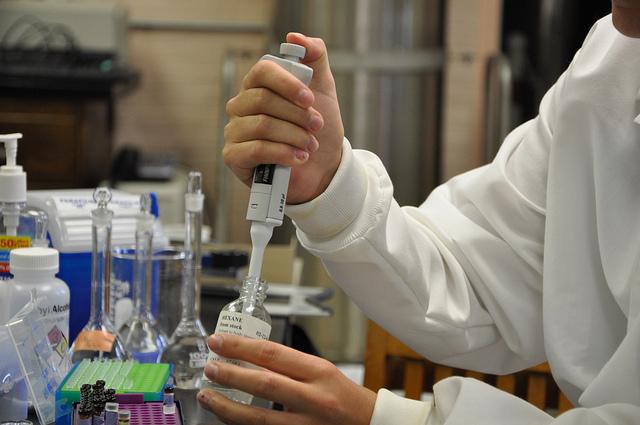The University of Wisconsin has long been among the best research institution in the nation, but recent rankings have some researchers worried about staying competitive with declining financial support.
National Science Foundation data shows UW continues to be at the forefront of research spending with just under $1.1 billion dollars spent on research across all fields. Even so, UW has dropped from fourth to sixth in research spending. Rankings are strictly based on research funding whether it be through state, federal or private sources, Natasha Kassulke, spokesperson for the UW Office of the Vice Chancellor for Research and Graduate Education, said.
Though this drop is not substantial considering UW still ranks higher than 640 other institutions ranked by NSF, Kassulke said this demotion could be linked to funding. UW has seen budget cuts in five of the last six state budgets which has limited the university’s ability give researchers the resources they need.
In a Dec. 2 interview with The Badger Herald, Chancellor Rebecca Blank said the drop is due to the political climate in Wisconsin and loss of faculty at UW. She said tenure and budget changes made top faculty at UW a “recruiting target” for other universities.
UW faces ‘chaos, uncertainty’ from state budget cuts in upcoming semesters
With less state funding, UW has less money to pay for researchers and necessary research materials. Kassulke said a lack of resources can make it harder for researchers to compete for federal grants and other funding.
Because of decreasing funds, UW has also become less attractive to researchers who bring research grants to the University. And recruiting high-level researchers is integral to promoting quality research on campus, Kassulke said.
David O’Connor, a UW researcher studying HIV and Zika, said federal funding is very competitive and only around 15 percent of applications get accepted. To receive these grants, researchers have to be at the top of their field, O’Connor said. But the budget for compensation for highly skilled researchers is in decline.
The drop in the rankings indicates that, across all fields, UW researchers are not getting as many federal grants as other research institutions, O’Connor said. To compete for these highly competitive grants, UW researchers are dependent on state dollars to pay for faculty salaries and research supplies which can be expensive, he said.
“It is important to explore the possibility that [dropping in rankings] is part of a sustained decline,” O’Connor said.
UW has seen decreases in funding that have drawn the attention of other top research institutions, Kassulke said. Competition for top researchers has caused some researchers at UW to continue their work at a different institution that could provide them with better resources and compensation, Kassulke said.
Many undergraduate students at UW are expected to have research experience, especially if they plan on going to graduate school or medical school, O’Connor said. Many of these undergrad students are paid through grants for the researcher, and if these grants decline that will mean less opportunity for undergrads to gain experience. O’Connor said without these opportunities, UW students may be less competitive compared to peers from other institutions.
To help retain important researchers and faculty, UW has invested nearly $24 million to counter offers made by other institutions, Kassulke said. While this investment has not ensured the retention of all UW staff, compensation is not the only thing attracting high-quality research.
“Sometimes it is less about salary and more about infrastructure and additional support to [researchers].”
UW spent nearly $24 million to retain staff following historic tenure changes
Most researchers do decide to stay with UW because they believe in the Wisconsin Idea and are committed to the university’s mission and goals, Kassulke said. She said many researchers speak highly of the students at UW.
O’Connor said even though UW is still ranked high among research institutions it is important to maintain this high level of quality. UW needs to continue to have a research environment that is attractive to high-level researchers or else they will be inclined to move somewhere with a better educational climate and more resources.
“It is much easier to work on the climate and make it as positive as you can rather than try to recover once you have lost it because that is more expensive and might well be impossible,” O’Connor said.
We have to ask the state to reinvest in the university to keep high-quality faculty as well as recruit more faculty, Kassulke said. She said the university may be able to find more research opportunities in fields that are currently not developed.
To help promote innovative research, the University has partnered with the Wisconsin Alumni Research Foundation (WARF) to established initiatives like UW2020, Kassulke said. This initiative is targeted at funding research that will change the current field as well as support high-risk and high-impact projects. These innovative research opportunities can help UW gain federal funding. Kassulke said with ground-breaking research, UW will be more competitive for federal grants.
WARF exhibit showcases inventions from university’s most innovative minds
“We need to keep telling our stories and showcase the great research that is going on,” Kassulke said. “Research contributes to a strong economy, creates jobs and touches everyone’s lives.”


















